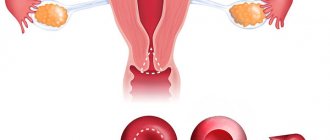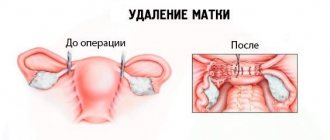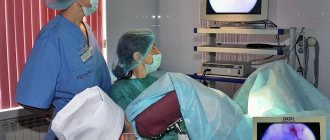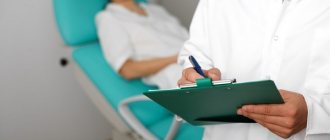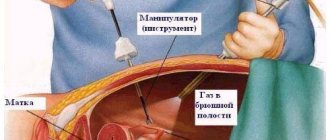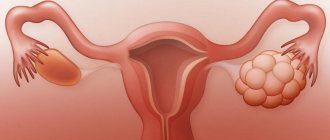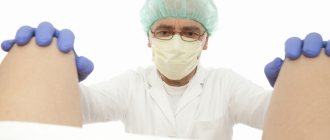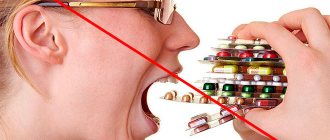In the case of severe bleeding, prolapse, adenomyosis, fibroids or other, even more serious gynecological problems, the decision to remove the uterus and ovaries seems correct and simple. But before agreeing to the operation, after listening to the doctor’s assurances that everything will be fine, the woman needs to have some knowledge. She must understand what will happen to her body after the procedure.
Surgery can have a serious impact on your overall well-being and quality of life. It is not without negative consequences. To smooth out their effect as much as possible, doctors prescribe special hormone replacement therapy. Taking prescribed medications is considered the best option for maintaining good health and maintaining women's health.
Do I need to take hormones after removal of the uterus and ovaries?
Despite the fact that each body is individual and all women tolerate the consequences of complex gynecological surgery differently, all doctors agree that hormonal medications after hysterectomy should be taken by all patients without exception. Complexes of drugs and their dosage are calculated individually, based on analyzes and diagnostic studies, as well as other factors.
The prescription must be made by a qualified and experienced doctor who has enough knowledge to formulate a complete hormone replacement therapy. He discusses with the patient all the details of the upcoming restoration of the body, answers her questions, and provides detailed information about the consequences of surgical invasion.
Oral medications
Klimonorm, one of the prescribed drugs after oophorectomy/hysterectomy
HRT with estradiol or its derivatives after surgery is carried out by using various forms of drugs (tablets, patches, creams, etc.). The choice is made based on the patient’s preferences, as well as the required dosage. The tablets are usually prescribed to women who are at high risk of developing colon cancer or who suffer from dry skin. Creams and patches are preferably used for diseases of the gallbladder and gastrointestinal tract (to avoid the negative effects of drugs on the digestive system).
Most often, after removal of the ovaries and reproductive organs, the following medications are recommended:
- Femoston. The drug is used every day, copes well with the signs of menopause and prevents the development of osteoporosis caused by hormonal problems.
- Klimonorm. The package contains 21 tablets. After completing the three-week course, the woman begins to have a semblance of menstruation, which helps prevent endometrial atrophy.
- Klymen. The medicine is prescribed after removal of the ovaries and reproductive organs in the presence of hormonal disorders, manifested by an excess of male sex hormones. Its use prevents thinning of hair on the head, the development of obesity, excessive growth of hair on the body, etc.
- Pauzogest is an estrogen-progestin drug that is taken continuously (28 days) and is prescribed to patients who prefer normalization of hormonal levels without the presence of menstrual-like bleeding.
Hormonal disorders: symptoms and signs
If after surgery a woman still has doubts about whether she should take hormones after hysterectomy, she should study the list of symptoms of hormonal deficiency. Among them, experts include the following negative conditions:
- fever and sweating;
- weight gain, which is difficult to control through exercise and diet;
- night sweats without an objective reason;
- problems sleeping, frequent waking up;
- depression, prolonged anxiety and emotional disorders;
- vaginal dryness;
- lack of desire (extremely low libido);
- fog;
- fatigue, lack of interest in life and the world around you;
- mood swings;
- migraine;
- frequent urination and urinary incontinence.
Such complex and severe torment can be avoided if you follow all the instructions of the gynecologist-endocrinologist and take care of your health responsibly and seriously.
Having survived the operation, you need to find an adequate doctor who will help with the appointment and will be able to monitor the patient in the long term, noting both improvements and deterioration of her condition after surgery.
Postoperative period
The first day after a hysterectomy, the patient should lie down, after a day she can begin to eat, and after a week (average period) her stitches are removed. During the first weeks, the lower abdomen will hurt (may radiate to the lower back), which is considered normal due to severe tissue trauma. A few medical recommendations:
- Sexual contacts are allowed 2 months after surgery.
- Lifting weights while on sick leave after a hysterectomy is dangerous - this can lead to vaginal prolapse and suture dehiscence.
- You can play sports (and give yourself other physical activity) six months after the operation, but you can give yourself light gymnastics after a month.
- 4 days after surgery you need to start douching.
Nutrition
After extirpation of the uterus or its partial removal, doctors insist on following a diet that involves eating porridge with water, light broths based on vegetables or poultry, and low-fat fermented milk products. You can eat nuts and plant foods. The ban includes products that can irritate the mucous membranes, as well as all bakery and confectionery products.
- Hawthorn - beneficial properties and contraindications of fruits. Healthy recipes from hawthorn berries and flowers
- Size chart for children's shoes in the table. Matching foot length and age
- Sesame oil - beneficial properties and contraindications. Composition and use of sesame oil with reviews and prices
Bandage
For the first week, especially after abdominal surgery, a woman needs to wear a support bandage, which is selected by a doctor: it reduces pain and is necessary for proper bowel function. The wearing period is 4-6 weeks, but the doctor may advise leaving it for a longer period if there are problems with the healing of postoperative sutures.
Various treatment options: how to survive artificial menopause
It is very important that women undergoing a rehabilitation period in the walls of gynecology after surgery are aware of the types of hormone replacement therapy available. A lot depends on the correct choice of therapy. First of all, it is health, a feeling of well-being and fullness of life.
At the present time, all drugs after surgery are divided into two groups:
- Synthetic hormones
These are drugs alien to the human body, which are in demand in pharmacy stores due to the fact that they are affordable and widespread.
- Bioidentical hormones
As the name suggests, drugs in this category are identical to hormones produced by the human body. Even without a medical education, you can guess that they are more preferable after the procedure.
However, their cost is quite high, and due to financial limitations, not all women can afford high-quality and safe therapy with these categories of drugs.
Can suppuration of a postoperative suture occur?
After surgery, one of the most common consequences is suppuration of the suture site. The cause of suppuration may be infection of the wound during surgery or immediately after it. The infectious route can be either direct or hematogenous (indirect). Direct infection is associated with poor disinfection of skin areas or instruments. Hematogenous infection occurs through the blood. The most common infectious irritants (pathogens) in the postoperative period are Pseudomonas aeruginosa and staphylococcus.
You can learn more about such an irritant as staphylococcus from this video:
Experts note that recently this pathology is occurring more and more often. This is due to several reasons:
- The emergence of microorganisms (their strains) resistant to pharmacological antibiotics;
- Weakened protective function of the immune system;
- Technical difficulties during the operational process.
When a suture becomes inflamed, an inflammatory process occurs, and its appearance is indicated by certain symptoms. At the location of the wound, pain may intensify, hyperemia may increase, swelling may occur, and the temperature level of the body may increase. A surgeon can diagnose pathologies during the rehabilitation period. The main changed indicators are determined by blood tests. If deeper suppuration of the suture site occurs (for example, in the presence of a vaginal suture), ultrasound diagnostics may be necessary. To increase the level of immune protection, immunostimulating and immunomodulating pharmaceutical drugs are prescribed. To prevent the occurrence of suppuration processes, it is necessary to observe aseptic (antiseptic) standards.
Quality drugs: the right decision
Estrogen, testosterone and progesterone levels can be restored to normal levels with the help of high-quality medications. This will allow you to get rid of all negative symptoms within a short period of time. A woman will feel healthy and cheerful again if she gives preference to medications recommended by qualified specialists.
Based on your individual characteristics, they will select hormones that are identical to the hormones produced by the body. This will eliminate the possible risk of harm to the body, which suffers after surgery and has symptoms of hormonal deficiency.
There is no point in refusing treatment or taking questionable medications if the resulting deficiency can be easily eliminated with an integrated approach to the preparation of hormone replacement therapy.
Can the suture come apart?
One of the consequences in the postoperative period as a result of removal of the uterine organ is suture dehiscence. It is extremely rare for a suture to come apart due to an allergic reaction (rejection) of the suture material. The following reasons are identified that determine the divergence of the suture site:
- Weakening the level of immune defense of the body;
- Strong tension on the edges of the incision (can occur due to improper performance of surgical actions or excessive physical exertion in the postoperative period);
- Taking certain medications (pharmacological) and medications;
- Infringement of capillary vessels of small diameter during surgical intervention;
- Infection in the area of the incision (wound);
- Removing suture material from the suture site too early.
If a change in the color of the suture element is detected, a weakened state of immunity can be determined. In this case, the edges of the seam will be smooth and may have a pinkish tint. The acquisition of a bluish or black tint by the suture indicates infringement of the capillary vessels. If the suture element diverges, the rehabilitation process is delayed and can cause psycho-emotional problems. If such consequences occur, as a rule, specialists perform the suturing again, and if there is a slight discrepancy, the wound is bandaged until complete recovery.
Hormones after removal of the uterus and ovaries
Medicines that are prescribed by gynecologists to all patients going through the rehabilitation period after removal of the uterus and ovaries are divided into several groups.
Estrogen treatment
This therapy is performed most often. Doctors prescribe the hormone to patients at the end of the postoperative period. First, they conduct all kinds of research in order to determine the optimal dosage, and then they write out a detailed dosage regimen, determine the duration of treatment, and give other valuable instructions.
Treatment with estrogen and progestin
In some cases, the effect of estrogen is supported by other means. In modern gynecological practice, the combination of “estrogen + progestin” is common. It is used to relieve symptoms of surgical menopause that a woman has experienced as a result of diagnosed health problems.
Testosterone and estradiol
This ligament is used to maintain libido and control the ratio of fat and muscle tissue. The doctor carefully calculates the dosage, since an excess of these hormones in a woman’s body is just as dangerous as a deficiency. But if you take the medicine correctly, then all negative consequences can be avoided.
Form of drugs
In pharmacies, hormonal drugs are sold in various forms. Women will be able to find medications prescribed by their doctor in the form of tablets. The use of transdermal, injectable, and intravaginal medications is also common. We are talking about suppositories, injections, creams and gels that help to survive the artificial climate with minimal noticeable discomfort.
In some cases, the use of herbal and homeopathic medicines occurs. They are prescribed to patients who have contraindications for full-fledged HRT.
Hysterectomy, its types and features
A surgical operation (hysterectomy), in which the uterus is amputated, has several types depending on its volume: with preservation or removal of the cervix, fallopian tubes or ovaries. During extirpation (complete removal), the reproductive organ is removed with all its elements - the neck, appendages, part of the vagina and lymph nodes.
The need to remove the appendages and cervix is determined by the reason for which the operation is performed. Depending on it, the method of intervention is chosen:
- Abdominal surgery. A transverse incision (less often: vertical) is made in the area above the pubis, through which the amputation procedure is performed. The disadvantage of this method is the long rehabilitation period, which is 1 – 1.5 months.
- Supravaginal method. It is used in cases of partial removal, when it is possible to preserve the cervix and remove only its body. The advantage of the method is the absence of scars on the woman’s body and rapid healing.
- Laparoscopy. The operation is performed using a special instrument - a laparoscope, which is inserted into the abdominal cavity through an incision near the navel. The procedure takes place without unnecessary damage, accurately and accurately. Contraindications are large cysts, enlarged uterine body, and prolapse.
Why are gynecology patients afraid of HRT?
There are many beliefs among women that force them to refuse treatment prescribed by a doctor. Which ones make sense and which ones are considered myths? Ladies will find the answer to this question in the current section:
- Fear of weight gain
This fear is greatly exaggerated. If you follow all the doctor’s instructions and follow the regimen he has developed for taking hormonal medications, their side effects in the form of weight gain can be avoided. It is also important to find original medications in the pharmacy chain, produced by a responsible brand with a strong reputation.
- Fear of losing femininity
Some women mistakenly associate taking hormones with the loss of femininity and the appearance of “male characteristics” in the form of hair growth throughout the body, changes in the timbre of the voice, etc. These fears are also exaggerated. Women after surgery are prescribed hormones, which, on the contrary, allow them to maintain libido and feel like a beautiful lady in every sense of the word.
- Severe side effects
Some hormonal drugs can actually have side effects on the body. His character is different. Therefore, before you start taking it, you should study the instructions and get the approval of your doctor.
Among the common side effects of HRT, he will list the following possible conditions:
- nausea and dizziness;
- disorders of the gastrointestinal tract;
- headache;
- insomnia, etc.
However, it is worth understanding the fact that the side effects of HRT are much less harmful to the body than completely refusing hormonal treatment after surgery. It is fraught with the formation of tumors, premature aging, etc.
What to do to achieve normal weight?
The most significant conditions:
- lead an active life (exercise, jogging, swimming, brisk walking, fitness - do anything of your choice)
- exclude products from sweet yeast baked goods, use whole grain flour (baked goods made from it), bran (for example, with oatmeal for breakfast)
- exclude fried, very spicy, smoked foods from the diet (it is better to boil, bake in its own juice, steam)
- give up sugar or minimize its amount if complete refusal is impossible; sugar can be replaced with fructose and honey, but their consumption should also be observed in moderation.
Recommendations for a speedy recovery
In addition to the fact that a woman will be prescribed hormonal medications, she may be advised on other methods for speedy recovery after complex surgery, the indications for which were conditions such as uterine fibroids, etc. Among them:
- Lifestyle correction
Women who have managed to adjust their lifestyle will be able to quickly experience the elimination of the negative symptoms of artificial menopause. By giving up smoking, eating questionable low-quality food and passive pastime, they will become healthier.
- Taking healthy supplements
The body needs high-quality vitamin and mineral complexes in order to recover quickly and compensate for the deficiency of important essential nutrients. It will be easier for weakened patients to survive a difficult stage of life after surgery if the body begins to receive external sources of vitamins and minerals.
- Following the doctor's instructions
Even after you have prescribed and started taking medications, you need to visit a doctor. You need to make an appointment with him regularly, since it is especially important for patients after removal of the internal genital organs to monitor all changes in the body in the long term.
A specialist from the antenatal clinic will accurately determine the duration of treatment to restore hormone levels, tell you what tests need to be taken to adjust the prescription, and also provide other types of medical care.
- Dr. Kegel's exercises
Using a set of special exercises developed by Kegel, a woman will be able to strengthen her pelvic floor muscles and keep them in good shape for as long as possible. This is very important, because after surgery, problems with urinary incontinence may arise, and this simple gymnastics effectively solves them.
How much does the operation cost?
Prices for hysterectomy in Moscow are determined by the type of surgical intervention, the level of the specialist performing the operation, and even the conditions that the clinic provides for follow-up inpatient care. The price range is wide - from 46,000 to 155,000 rubles, so each case must be clarified individually. An approximate picture looks like this:
| Type of operation | Price |
| Subtotal | from 50,000 rub. |
| Total | from 80,000 rub. |
| Radical | from 120,000 rub. |

